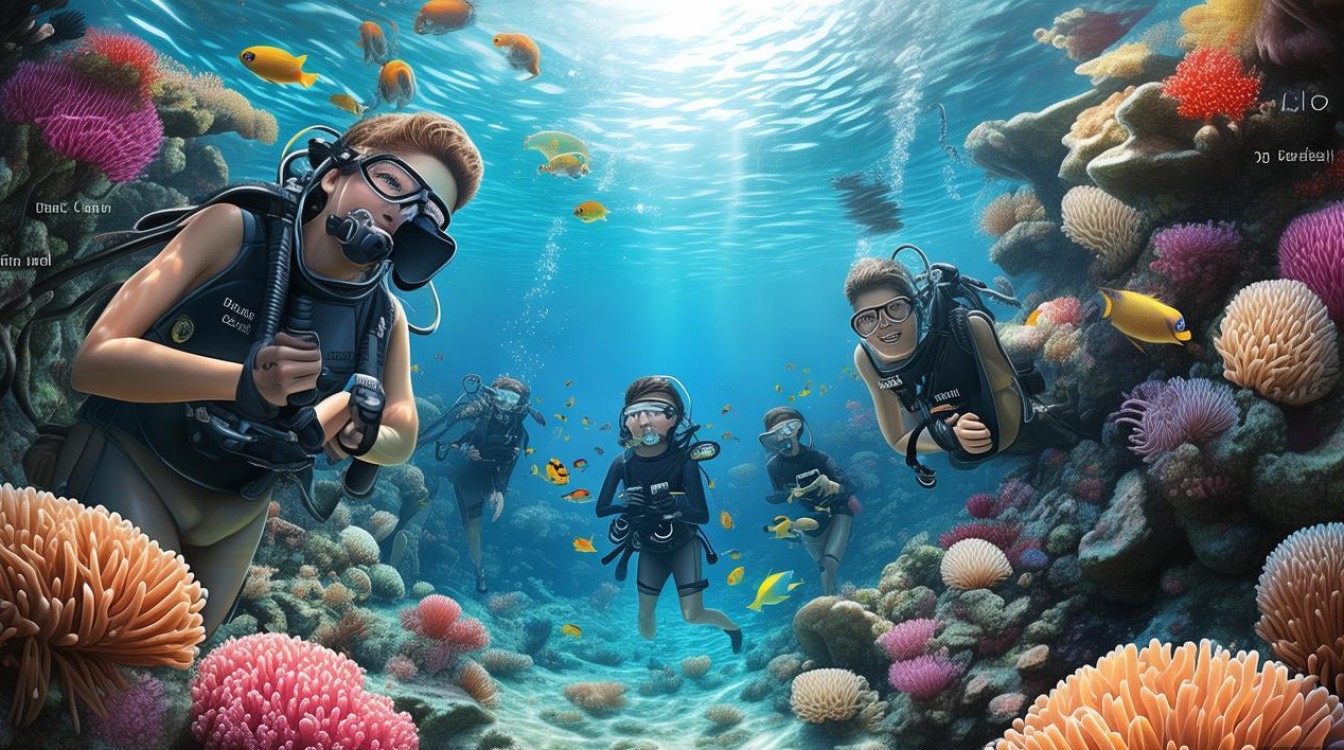雅思口语中的Snorkeling话题解析
在雅思口语考试中,"snorkeling"(浮潜)是一个高频话题,常出现在Part 1的休闲活动、Part 2的个人经历以及Part 3的环保讨论中,许多考生对此话题感到陌生,但其实只要掌握核心词汇、表达方式和逻辑结构,就能轻松应对,本文将从词汇积累、话题拆解、高分技巧和常见误区四个方面,全面解析如何围绕snorkeling展开流畅自然的口语表达。

核心词汇与表达
掌握与snorkeling相关的词汇是基础,以下分类整理了高频词汇和短语,帮助考生精准描述体验:
-
设备与动作
- Snorkel(呼吸管)、mask(面镜)、fins(脚蹼)
- Put on gear(穿戴装备)、dip into the water(入水)、float on the surface(漂浮于水面)
- Dive down(下潜)、spot marine life(观察海洋生物)
-
感官体验
- Crystal-clear water(清澈见底的水)、vibrant coral reefs(色彩斑斓的珊瑚礁)
- Tropical fish(热带鱼)、sea turtles(海龟)、manta rays(魔鬼鱼)
- Peaceful and serene(宁静祥和的)、breathtaking views(令人惊叹的景色)
-
情感与评价
- Thrilling and exciting(刺激又兴奋)、unforgettable experience(难忘的经历)
- Connect with nature(与自然亲近)、conservation awareness(环保意识)
示例句子:
- "Last summer, I went snorkeling in the Maldives, where the water was so crystal-clear that I could see schools of tropical fish swimming beneath me."
- "Wearing the mask and snorkel allowed me to breathe comfortably while observing the vibrant coral reefs up close."
话题拆解与回答框架
雅思口语中关于snorkeling的问题通常分为三类,考生需针对性准备:
Part 1:基础问答(Do you like...? / Have you ever...?)
- 问题示例:
- "Have you ever been snorkeling?"
- "What do you think of snorkeling as a hobby?"
- 回答策略:
- 简单直接回答,补充1-2个细节。
- 结构:回答(Yes/No)+ 经历描述 + 个人感受。
- 范例:
"Yes, I tried snorkeling last year in Hainan. It was my first time, and I was a bit nervous at first, but once I put on the gear and floated on the surface, I felt completely relaxed. The experience of seeing colorful fish swimming around me was magical."
Part 2:个人经历(Describe a water sport you tried...)
- 问题示例:
"Describe a time you tried a water sport. You should say:- what the sport was,
- where you did it,
- who you were with,
- and explain how you felt about it."
- 回答策略:
- 用"经历-细节-感受"的逻辑展开,加入具体数据和感官描写。
- 结构:引入(时间/地点)+ 准备过程 + 活动细节 + 情感升华。
- 范例:
"I’d like to talk about my snorkeling experience in the Great Barrier Reef during a trip to Australia with my family two years ago. After a quick safety briefing from the instructor, we put on our masks and fins and waded into the turquoise water. What amazed me most was the diversity of marine life—I spotted a giant sea turtle gliding gracefully and a clownfish hiding in an anemone. It was humbling to realize how fragile this ecosystem is, and I left with a stronger sense of environmental responsibility."
Part 3:深度讨论(环保/旅游影响)
- 问题示例:
- "Do you think water sports like snorkeling have a negative impact on the environment?"
- "How can people protect marine life while enjoying such activities?"
- 回答策略:
- 表达观点,给出原因和解决方案,展示批判性思维。
- 结构:观点 + 论据(举例/数据)+ 建议 +
- 范例:
"While snorkeling itself isn’t harmful, unregulated tourism can damage coral reefs through physical contact or pollution. For instance, some tourists touch or stand on coral, which kills the organisms that build it. To mitigate this, authorities should enforce strict guidelines, like limiting the number of visitors and requiring eco-friendly sunscreen. Additionally, educating tourists about conservation can foster a more responsible approach to enjoying these natural wonders."
高分技巧与注意事项
-
避免模板化回答:
不要机械背诵"it was fun"或"it was interesting",而是用具体细节(如"I was mesmerized by the way sunlight danced through the water")展现个性。
-
灵活运用连接词:
- 使用"initially," "gradually," "moreover"等词汇增强逻辑性。
"Initially, I struggled with breathing through the snorkel, but gradually, I got the hang of it and could enjoy the scenery peacefully."
- 使用"initially," "gradually," "moreover"等词汇增强逻辑性。
-
展示词汇广度:
替换重复词汇,如用"explore"代替"see","vast"代替"big"。
-
文化视角加分:
提及不同国家的snorkeling文化(如东南亚的生态旅游政策),体现知识储备。
常见误区与避坑指南
-
误区:描述过于笼统。
- 纠正:加入具体数据(如"depth of 5 meters")或专业术语(如"snorkeling vs. scuba diving")。
-
误区:忽略环保话题。
- 纠正:提前准备1-2个环保观点,如"plastic waste threatens marine habitats"以应对Part 3。
-
误区:语法错误频出。
- 纠正:重点练习现在完成时("I have always wanted to try snorkeling")和被动语态("Coral reefs are protected by law")。
相关问答FAQs
Q1: 雅思口语中如何描述第一次尝试snorkeling的感受?
A1: 描述初次体验时,可按"紧张-适应-惊喜"的层次展开。
"Being a non-swimmer, I was terrified at first, clutching the inflatable buoy tightly. But the instructor taught me to relax and breathe slowly. Once I floated face-down, the underwater world opened up—I saw parrotfish nibbling on coral, and the silence was only broken by my own breath. It was a mix of anxiety and awe, and by the end, I felt proud of overcoming my fear."
Q2: 如何用高分词汇对比snorkeling和其他水上运动?
A2: 通过对比突出snorkeling的独特性,
"Unlike surfing, which demands physical strength and balance, snorkeling is more about patience and observation. While jet skiing offers adrenaline, snorkeling provides a meditative escape into nature. For instance, whereas scuba diving requires certification and heavy gear, snorkeling is accessible to beginners with minimal equipment, making it a gateway to marine exploration."
通过以上方法,考生不仅能从容应对snorkeling相关话题,还能在词汇、逻辑和深度上脱颖而出,为雅思口语高分打下坚实基础。











